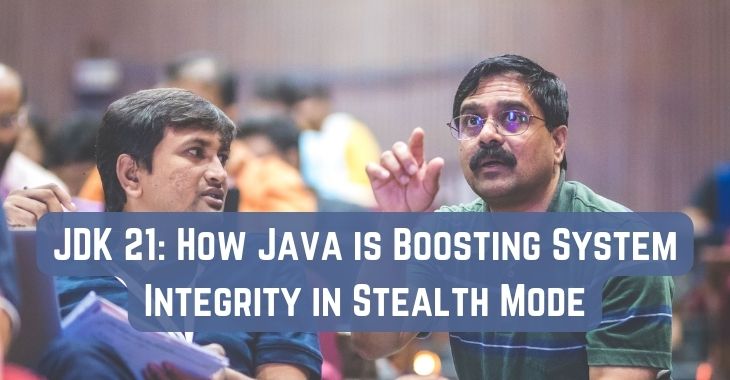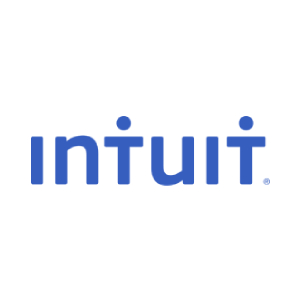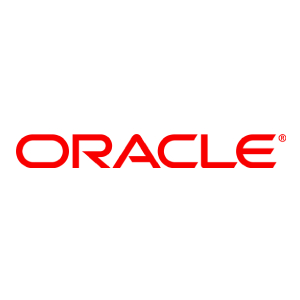
“Once again Saltmarch has knocked it out of the park with interesting speakers, engaging content and challenging ideas. No jetlag fog at all, which counts for how interesting the whole thing was."
Cybersecurity Lead, PwC

This article explores the significant impact of JDK 21's update on software integrity in the Java ecosystem. It delves into the gradual phase-out of dynamically loaded agents in the JVM and the reasons behind this decision. You will also learn about potential adjustments that developers may need to make in their coding practices and strategies to adapt to this change.
There's a silent revolution brewing in the tech world, one line of code at a time. As C.S. Lewis once said, "Integrity is doing the right thing, even when no one is watching." That's precisely what the latest update in Java's codebase —JDK 21— intends to accomplish: tightening system integrity, all while most of us go about our daily lives, blissfully unaware.
Let's break it down - dynamic loading of agents into a running Java Virtual Machine (JVM), a powerful tool, will be gradually phased out. This means that agents will no longer be able to be loaded into a running JVM after startup. What does this mean for users and developers? Users may not notice the change, but they stand to benefit significantly from a more robust, resilient digital ecosystem. The changes heralded by JDK 21 might mean an adjustment period for developers who have come to rely on the powerful flexibility offered by dynamically loaded agents. The familiar paradigms might need to be rethought, strategies rehashed. However, the trade-off is a software ecosystem that's more robust, resilient, and less prone to vulnerabilities. It's not just about keeping software integrity intact for the developers; it's also about fostering trust and reliability in the broader Java ecosystem. And these attributes are critical to ensuring that Java continues its reign as the go-to platform for developers worldwide.
Software serviceability - the capability to monitor, debug, and troubleshoot running applications - has long been Java's claim to fame. But with greater power comes greater responsibility. JDK 21 aims to strike a balance between the need for serviceability and ensuring system integrity.
The dynamic loading of agents is a powerful tool that can be used for serviceability purposes. However, it is also a potential security risk. JEP 451 will disallow the dynamic loading of agents by default. This means that agents can only be loaded at startup. This will help to improve system integrity and reduce the risk of security vulnerabilities. The idea here is not to stifle the power of serviceability but to ensure it's used judiciously and securely. JDK 21's strategy to phase out the dynamic loading of agents is akin to guiding the software ecosystem towards more conscious, responsible use of its serviceability tools.
The JEP 451 proposal doesn't seek to confine the power of agents or cripple the functionalities of the Attach API that are fundamental to Java's serviceability toolbox. It aims to lay down a robust framework where integrity is not an afterthought or a bonus but a default setting. From allowing dynamic loading of agents by default, the software will now require explicit permission from users to do so. This paradigm shift, as subtle as it may be, is a giant leap towards making software integrity an inherent part of the system.
JEP 451 tightens the reins on dynamically loaded agents—an operative that, while potentially useful, poses risks if misused or mismanaged. A dynamically loaded agent can surreptitiously alter the running code, possibly compromising the system's integrity or causing a detrimental ripple effect. By making the dynamic loading of agents an opt-in feature, Java is proactively reducing the risk of such adverse events. Instead of leaving the door wide open for agents to march in anytime, JEP 451 introduces a checkpoint—a subtle pause asking, "Are you sure?"
While agents are primarily meant to aid in application debugging and profiling, some libraries have misused these agents to bypass codebase rules, silently altering the application or even JDK classes. The new move towards restricting dynamic loading of agents is a smart play towards preserving the codebase integrity.
In a perfect world, agents in the JVM ecosystem are the unobtrusive helpers that come in handy during debugging and profiling sessions. Some libraries have been found to misuse these agents as stealthy code ninjas, discreetly bypassing the established rules of the codebase. This stealthy play has sparked concern among developers and users alike. The dynamic loading of agents was never meant to be a backdoor for uncontrolled modifications. In the face of such misuse, the folks behind the JEP 451 are making a definitive stand. By restricting the dynamic loading of agents, JEP 451 ensures that agents can't simply waltz into the JVM and start rearranging the furniture.
This proposed shift is not without its challenges. Some serviceability tools will need to rethink their operations. Certain serviceability tools load agents dynamically to gain access to the internals of the HotSpot Virtual Machine. They use this access to profile native code or to get precise performance statistics, capitalizing on the flexibility of dynamic agent loading. This shift also means application owners will need to be more involved in the process. They'll be the gatekeepers, deciding whether to allow the dynamic loading of agents. By including the -XX:+EnableDynamicAgentLoading option or the -javaagent option in the command line, they can give the green light to agents that need to be loaded dynamically or at startup, respectively.
With the Java Enhancement Process (JEP) 451, we're looking at a future where the power of agents is harnessed responsibly, where the system's integrity is held high, and where serviceability does not compromise system stability.
In the end, it all boils down to integrity—ensuring that software does what it's supposed to do, even when no one is watching.
The changes proposed by JDK 21 are all about integrity. It's about making sure that our applications, our software, and our digital platforms do the right thing—always. Whether it's seen or unseen, whether it's appreciated or goes unnoticed, integrity remains the cornerstone of a resilient digital ecosystem. As we step into a future shaped and driven by technology, it's heartening to see that Java continues to prioritize integrity, building it into the very fabric of its code. In the words of C.S. Lewis, it's truly about doing the right thing, even when no one is watching.
Have questions or comments about this article? Reach out to us here.
Banner Image Credits: Dr. Venkat Subramaniam at his workshop at Great International Developer Summit

“Once again Saltmarch has knocked it out of the park with interesting speakers, engaging content and challenging ideas. No jetlag fog at all, which counts for how interesting the whole thing was."
Cybersecurity Lead, PwC

“Very much looking forward to next year. I will be keeping my eye out for the date so I can make sure I lock it in my calendar."
Software Engineering Specialist, Intuit

“Best conference I have ever been to with lots of insights and information on next generation technologies and those that are the need of the hour."
Software Architect, GroupOn

“Happy to meet everyone who came from near and far. Glad to know you've discovered some great lessons here, and glad you joined us for all the discoveries great and small."
Web Architect & Principal Engineer, Scott Davis

“Wonderful set of conferences, well organized, fantastic speakers, and an amazingly interactive set of audience. Thanks for having me at the events!"
Founder of Agile Developer Inc., Dr. Venkat Subramaniam

“What a buzz! The events have been instrumental in bringing the whole software community together. There has been something for everyone from developers to architects to business to vendors. Thanks everyone!"
Voltaire Yap, Global Events Manager, Oracle Corp.